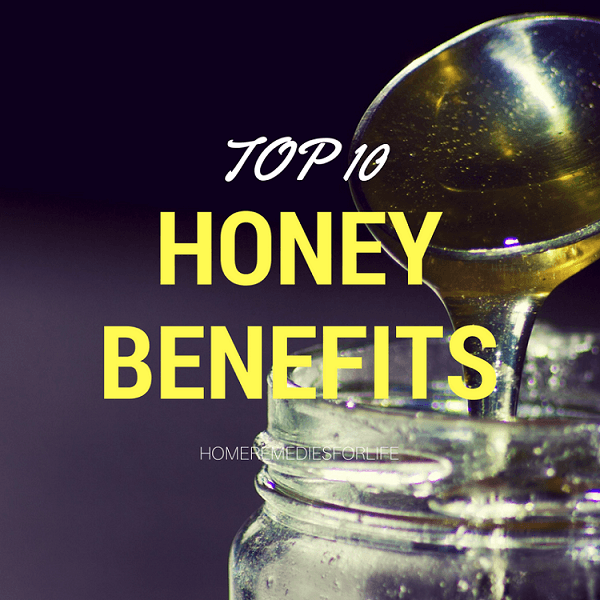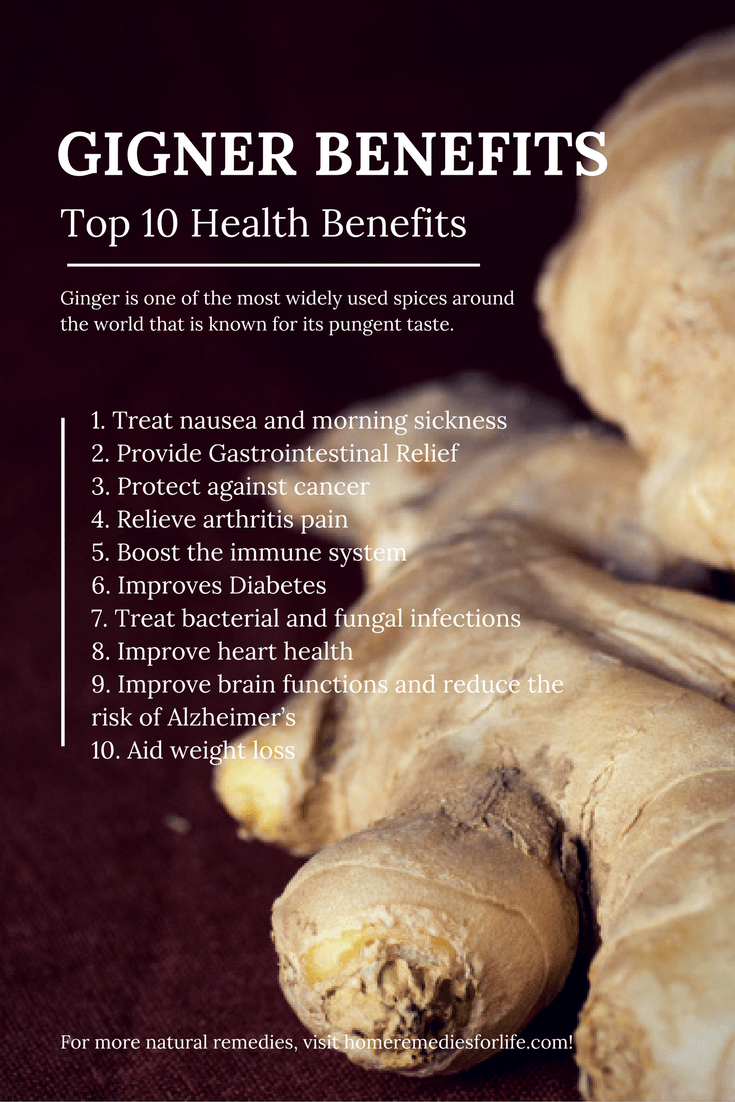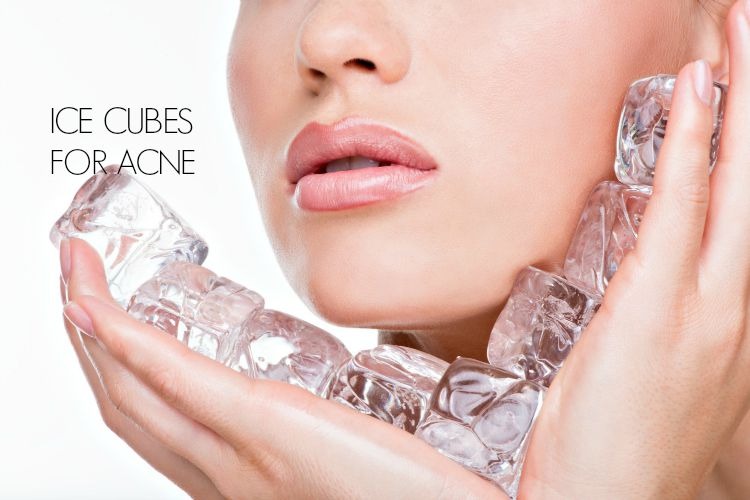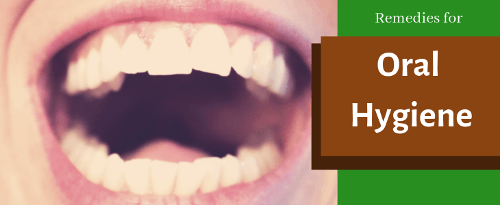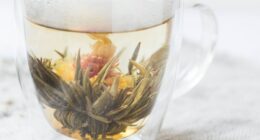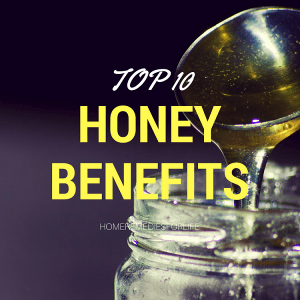 All of us are familiar with honey as a home remedy, which is popularly used as a substitute for sugar. But did you know that it has potent antiseptic and antibacterial properties and is loaded with antioxidants which make it a super food with numerous health benefits.
All of us are familiar with honey as a home remedy, which is popularly used as a substitute for sugar. But did you know that it has potent antiseptic and antibacterial properties and is loaded with antioxidants which make it a super food with numerous health benefits.
The medicinal properties of honey helps to treat infections and allergies, speed up the healing of burns and wounds, provide relief from cough and reduce the risk of cancer.
But the health benefits of honey depend on the type and quality of honey. Honey is available in both raw and pasteurized forms.
Raw honey, that is bottled directly from the hive contain traces of wax, pollen and yeast which makes it even healthier.
Pasteurized honey is heated and processed to remove the impurities which also reduce the beneficial properties of the honey.
Honey is graded based o its color, taste and aroma. The clear and light amber colored honey has a higher price compared to darker varieties.
In this article, we have listed all the health benefits of honey along with the side effects of consuming honey and guidelines to select and store honey.
10 Amazing Health Benefits of Honey:
1. Anti-Cancer
For many years researchers have overlooked the cancer-fighting properties of honey. Honey has powerful carcinogen-preventing and anti-tumor properties and in recent years comprehensive studies are showing the potential role of honey in preventing the progression of cancerous tumors. Cancer feeds on glucose, but this does not happen in case of honey. The powerful flavonoids and phenolic compounds in honey render the anti-metastatic properties that destroy cancer and tumors. Honey contains – gallic acid, chrysin, elegiac acid, p-Coumaric acid, syringic acid, ferulic acid and caffeic acid – all of which contribute to the healing properties of honey. But it is best to opt for raw and unprocessed honey for the best result.
2. Alleviates Allergy
The strong anti-inflammatory effect of honey not on relieves cough and throat irritation but also relieves symptoms of seasonal allergy. Doctors believe that honey works as a natural vaccine. Small amount of pollen is present in honey. When the body is exposed to this small amount of pollen it triggers the immune system to respond and produce antibodies to fight the pollens. Repeated exposure to small amount of pollen helps to build up the antibodies and the body becomes more accustomed to the presence of pollens in the surrounding environment. As the body gets accustomed to this condition, less histamine is released causing less allergic reaction.
3. Boost Energy
Honey has been used since the begging of time as a source of energy. Ancient Athletes competing in the Olympics would consume honey and figs to get an instant boost of energy. And research now proves that honey is actually effective in maintaining glycogen levels and speeding up the recovery time compared to other energy drinks. Honey is a potent source carbohydrate that breaks down into fructose and glucose and readily enters the bloodstream which provides a quick boost of energy. The quick rise in blood sugar acts as a short-term source of energy during vigorous workouts and endurance exercises.
4. Improves Memory
Raw honey is a storehouse of antioxidants that prevents cellular damage in the brain caused by free radicals and inflammation. Honey improves the absorption of calcium in the body which aids brain health. The brain requires calcium for thought processing and decision making. A study published in 0171 in Menopause found that consuming a spoonful of Malaysian honey on a daily basis boosts memory in postmenopausal women. It leads to the conclusion that honey can be used as an alternative therapy for hormone-related intellectual decline. It has been noticed that after consuming 20 grams of honey a day for 4 months the women had better short-term memory compared to those who consumed hormone pills.
5. Cough Suppressant
Honey, especially buckwheat honey is an effective home remedy for relieving persistent cough and throat irritation. In a study done on 110 children, it was seen that a single dose of buckwheat honey was as effective as a single dose of dextromethorphan in relieving night-time cough and promoting restful sleep. The thick consistency of honey coats the throat and soothes the inflammation of the throat tissues. The sweet taste of honey activates the nerve endings that protect the throat from incessant cough. Honey is also useful for treating infection of the upper respiratory tract.
6. Promotes Restful Sleep
Majority of the population has problems with sleeping and honey acts as a natural substitute for sleeping pills. The amino acids such as tryptophan promote restful sleep. The sweetness of Honey causes a rise in insulin and serotonin – a neurokinetic therapy that boosts mood and happiness. The brain converts serotonin into melatonin, a chemical compound that controls the quality and length of sleep. You can take a teaspoon of honey each evening instead of popping a sleeping pill to calm your body and mind and improve the duration and quality of your sleep.
7. Treat Cuts and Burns
Topical application of honey to wounds and burns can speed up the healing process. Using honey for treating cuts and aberrations is as effective as silver sulfadiazine, which is a conventional treatment. The natural antibiotic and antibacterial properties of honey disinfects the wounds and burns and cuts out the risk of infection caused by Staphylococcus aureus bacteria. The simple sugars in honey have a drying effect that speeds up the healing of the wounds. A study published in 2005 in the British Journal of Surgery found out that almost 99% of the patients who suffered from wounds and leg ulcers showed remarkable improvement after applying honey topically to the wounds.
8. Treats Dandruff and Improves Scalp
According to researchers, honey diluted with warm water can improve seborrhic dermatitis significantly. Dermatitis is a condition of the scalp that causes dandruff and itching. A 2001 study published in the European Journal of Medical Research revealed that applying honey diluted with 10% warm water to the scalp and leaving it on for 3 hours lead to itch relief with no scaling was noticed throughout the week. Skin lesions were healed and candidates even shoed an improvement in hair loss. The potent antibacterial and antifungal properties of honey prevent the overgrowth of fungus that causes dandruff. Anti-inflammatory properties of honey also relieve the redness and itching of the scalp.
9. Aids Weight Management
Research and studies have found strong links between honey consumption and weight loss. A study at the San Diego State University found that replacing sugar with honey in your foods can prevent adding on extra pounds while lowering blood sugar levels in the body. The result also shows that compared to sugar, honey can lower serum triglycerides significantly. Raw honey has the capacity to activate the hormones that suppress appetite and reduce hunger. You can prepare a drink by adding a tea spoon of honey to a glass of lukewarm water and drink it daily in the morning before breakfast. You can also add the juice of 1/2 lemon to it.
10. Boost the Immune System
Manuka honey is especially effective in stimulating the production of immune cells that strengthen the immune system. Studies also show that a daily dose of raw honey can raise the level of antioxidants in the body. The antioxidants block the free radicals which otherwise cause a number of chronic diseases. Antioxidants also boost the immune system while the polyphenols reduce the risk of cancer and heart disease. A study conducted on 25 subjects fed the subjects about 4 tablespoons of honey every day for 29 days along with their regular diet. When the blood samples were taken at the beginning and end of the study it was seen that there is a direct link between consumption of honey and increased levels of polyphenols in the blood.
Cautions while Using Honey:
Honey is likely sage when taken orally or applied topically to the skin.
- It is best not to feed honey to infants. Spores of Clostridium botulinum have been found in traces in honey. Although, it is not dangerous for older children and adults, but it can cause infant botulism.
- Honey is a type of sugar, so it should not be consumed in excess amounts if you want to maintain healthy weight and keep your blood sugar at a steady level.
- Those who are susceptible to pollen allergy should be careful while consuming honey. People with bee-related allergies should also be careful while consuming honey. Allergic reactions to honey include asthma, cough, hives, inflammation and itching of the tongue and lip, difficulty swallowing, shortness of breath, wheezing, swelling under the skin, etc.
- When honey is made from plants belonging to the Rhododendron genus it can cause toxicity in the body and lead to abnormal or absent heart rhythms, blurred vision, diarrhea, faintness, fatigue, fever, heart attack and honey intoxication.
- People with bleeding disorders should be cautious while taking honey because honey may increase the risk of bleeding.
Most Popular Types of Honey:
Alfalfa – The honey produced form the white or light amber-colored flowers of Alfalfa is called alfalfa honey. It is widely available and good for everyday use.
Blueberry – Blueberry honey is not honey with blueberry flavors or added blueberries. It is the honey derived from blueberry blossoms. It ranges from light amber to deep amber color with a well-rounded flavor. It is mostly used for preparing sauces and baking.
Buckwheat – Buckwheat honey is produced from buckwheat flowers and has a dark brown color and strong flavor. It is used for baking and preparing barbeque sauces.
Clover – Clover honey is the most common type of honey or table honey. It has a light amber color and delicate taste. Clover honey is derived from red clover and White Dutch clover.
Manuka – Manuka honey is produced from the nectar of the Manuka tree. It has a strong earth and herbaceous flavor and dark cream to dark brown color. It has potent medicinal properties.
Orange Blossom – Orange blossom honey can be pure or mixed with the nectar of various citrus flowers such as lemon, lime, etc. It is an expensive table honey that is often used in baking cakes and cookies.
Wildflower – Wildflower honey is also known as polyfloral honey. It is derived from the nectar of various species of wild flowers and blossoms. The taste, aroma and flavor of wildflower honey vary from season to season.
How to Select and Store Honey?
Know the basic types – Honey comes in two basic types – blossom or nectar honey and honeydew or forest honey. Blossom honey is produced from the nectar of flowers while honeydew honey is produced from the sweet excretion of insects.
Varieties of honey – Honey are categorized by the source or location. The honey pod cued from the nectar of a particular flower or blossom has the aroma of the flower along with a distinct taste and color which is entirely different from the honey produced from the nectar of another flower. Multifloral honey is created from the nectar of various types of flowers that bloom around the hive. Single flower or monofloral honey is created from the nectar of one type of flower.
Presentation – The presentation of the honey which involves minimal healing and processing is considered the best quality honey.
- Comb honey – It is sold packaged in the bee wax comb. It is the freshest and purest form of honey you can get.
- Cut Comb – In case of cut comb honey, a few pieces of the comb honey is cut up into pieces and added to the honey in the container.
- Drained honey – This honey is collected by draining the honey comb.
- Extracted Honey – In this case, honey is obtained by extracting it from the comb.
- Granulated Honey – Glucose in the honey gets crystallized. Honey that has higher glucose to fructose proportion and higher water content crystallizes rapidly. But it does not affect the quality or the taste of the honey. Just put the jar in warm water for an hour to liquefy the honey.
Processing – Raw honey is the best form of honey that has been taken out of the cells of the honey comb and it stays in its crude form. It contains the bee pollen and propolis that has numerous health benefits. It is not filtered or pasteurized and 100% free from additives. Filtered honey is heavily processed. A significant amount of beneficial pollen is removed from the honey.
Storing – Store honey at room temperature in your kitchen cupboard or pantry shelf. Storing honey in the refrigerator speeds up the crystallization process of honey. It is a natural process and not and does not indicate spoilage or impurity.
In order to enjoy the goodness of honey to the fullest, make sure you use pure and raw honey which contains all the vitamins, minerals and enzymes in the best form.
